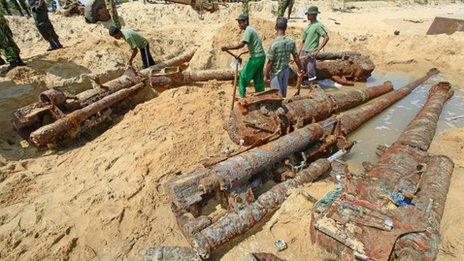Q&A: Post-war Sri Lanka
- Published

Sri Lanka's army defeated separatist Tamil Tiger rebels in May 2009 after 26 years of civil war.
Allegations of atrocities during the closing stages of that war have dogged the government ever since it ended. The rebels were also accused of abuses.
The government has strenuously denied such allegations and insist they are on the path of reconciliation and rebuilding Sri Lanka's north.
What happened in the war?
After independence from British rule, increasingly assertive Sinhala nationalists, resentful of what they saw as British favouritism towards minority Tamils, began to fan the flames of ethnic division.
A Tamil separatist movement gained momentum during the 1970s when a number of armed Tamil groups emerged in the north and parts of eastern Sri Lanka.
But in 1983 the insurgency was transformed after a brutal anti-Tamil backlash following the killing by insurgents of 13 soldiers spread throughout the country.
The Liberation Tigers of Tamil Eelam (LTTE) emerged under the leadership of Velupillai Prabhakaran as a ruthless and highly effective fighting force. It came to run what was in effect a shadow state in the north and east.
The group used suicide bombings and other attacks to devastating effect in the capital Colombo and elsewhere in the 1990s. It also killed high-profile figures, including Indian Prime Minister Rajiv Gandhi and Sri Lankan President Ranasinghe Premadasa.
After various peace initiatives and ceasefires failed, the government launched a final offensive in 2009 and defeated the Tigers.
How many people were killed?
Until the final months of the war, the death toll for more than 25 years of conflict was estimated to be about 70,000.
But the final phase, when the government and rebels battled it out as thousands of civilians were hemmed in to a tiny strip of land on the north-eastern coast, has been the subject of most scrutiny.
Estimates range from 20,000-75,000 killed in the final assault, but a government estimate put the figure at about 9,000.
What were the main allegations against the government and rebels?
A 2011 UN report said hospitals, UN centres and ships belonging to the Red Cross were deliberately targeted by the army.
The government was accused of using heavy weaponry and UN images obtained by the BBC appeared to show shelling damage in a government-designated "safe zone" for civilians.
The report also accused the Tamil Tigers of using civilians as human shields, saying the rebels shot those who tried to escape. It also said that the rebels positioned heavy weapons in hospital grounds.
Sri Lanka rejected the claims in the report as biased and fraudulent.
What efforts have been made to promote post-war reconciliation?
Critics say there has been little serious attempt to do this so far.
The government appointed a Lessons Learnt and Reconciliation Commission, which cleared the military of allegations that it had deliberately attacked civilians.
Rights groups dismissed the inquiry as "flawed".
In September 2013 the government held elections for a semi-autonomous council in the island's Tamil-majority north, a move which it said was a significant step in the reconciliation process.
The Tamil National Alliance (TNA) won 30 seats in the 38-member council and now forms the first functioning provincial government in the north.
The TNA's 80-year-old leader, Rajavarothiam Sampanthan, said the victory was a chance for everybody to "think afresh about the future".
Is there any chance of a return to Tamil militancy?
The overwhelming majority of analysts agree that in the short term at least the answer is a resounding "no".
After so many years of war, many Sri Lankan Tamils are war-weary and struggling to earn a living.
But many also warn that the government runs the risk of alienating the minority if it does not act on political reconciliation.
- Published9 January 2015
- Published24 April 2009
- Published11 October 2012
- Published15 August 2012
- Published9 January 2015